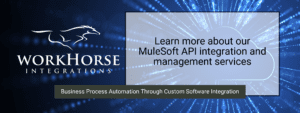Choosing the right API integration service provider can be daunting for any business. Software integration services require an ability to navigate specific business domains. This includes a thorough knowledge of legacy systems and the ability to engage both leadership and staff. Selecting the right software integration consultant leads to greater productivity and efficiency while reducing time and financial costs. CTOs and IT professionals can use these principles when hiring an API integration service provider.
What Is API Integration?
API Integration happens when two or more applications connect via their specific programming interfaces (or APIs) to share data sources and other critical business functions. Organizations with an API business model experience an increase in overall efficiency and productivity. An API business model also allows an enterprise to drive internal collaborations, reach potential new markets, and enhance the consumer experience. Although there are multiple types of API business models, finding the right service provider is a critical next step in adopting a digital transformation strategy.
Getting the right API integration service provider will help your organization decide whether to adopt an integration-first vs. an API-first approach. The right provider will know best practices working with software integration platforms and your particular business domain. They will help you negotiate the integration process, assist in training and updating leadership and staff. In addition, they assure a consistent software integration process with on-the-spot and follow-up consulting.
Factors for Selecting an API Integration Service Provider
Whether you are a Chief Technology Officer (CTO) or an upper-level IT professional, you have several factors to consider when choosing the right API Integration Service Provider. Although the process may resemble hiring a consultant for any other business function, there are several key differences to consider. These factors include
-
Software Integration Platform Experience
Many integration service providers have particular expertise in a specific platform that provides either embedded integration or cloud-based integration. Good providers have thorough experience (including professional certification) and a strong background in executing digital strategy. This knowledge and experience with a specific software integration platform facilitate adoption by the business.
-
Ongoing Support
Implementing an API integration is an intricate process that requires consistent adjustment and refinement. Although many API integration platforms allow for real-time adjustment, some businesses require further follow-up based on changes to hardware. They could also be integrating different hardware such as mobile devices or updated desktops/laptops. Many API integration service providers provide consistent follow-up and support when needed on highly technical matters. This empowers businesses to focus on internal processes and troubleshoot potential issues.
-
Specific Business Expertise
Fields such as logistics, supply chain, and manufacturing contain many different software packages which handle an intricate set of procedures and processes. An API integration service provider with experience in the particular issues of your business domain can ensure efficient implementation and execution of integrating software APIs.
-
Project Management
API integration for any business requires three key components: a strong sense of business context, a vision for the end goal, and a thorough understanding of a business’s systems and data structure. An ideal API integration service specialist has project management skills to oversee such a complex and intricate process. Regardless of project management methodology, the appropriate integration service provider will have the skills and technical knowledge to foster and drive the project through completion.
-
Soft Skills for Project Management
Unlike “hard skills” such as software expertise or coding in a specific programming language, “soft skills” are often harder to learn and are more reliant on a professional’s temperament and values. However, an ideal API integration service specialist should possess soft skills like emotional intelligence, creativity, and problem-solving. Soft skills can enhance productivity through driving internal collaboration, managing key deliverables, and providing consistent feedback throughout the integration process.
Two Must-Have Factors For Service Providers
Many businesses rely solely on word-of-mouth testimonials from their peers, but further work is necessary for finding the proper integration service provider. There are two must-have factors to consider when hiring an API integration service specialist:
- Strong References – For many software integration specialists, their reputation is only as strong as their strongest references. Requesting and following through on past project references provides businesses guidance and insight into the quality of past work. Checking references can also reveal the scope and range of an integration service provider’s past work. This helps to inform you about how a particular provider’s services will “fit” within your organization.
- Trustworthiness – Ideally, the service provider you hire will be working alongside your IT team with access to many internal business processes. After considering many of the previously mentioned factors, your decision to hire an API integration service provider will come down to their ability to inspire trust and confidence. Although this is not an easy process, hiring a trusted API integration service provider reduces cost and increases productivity and efficiency.


